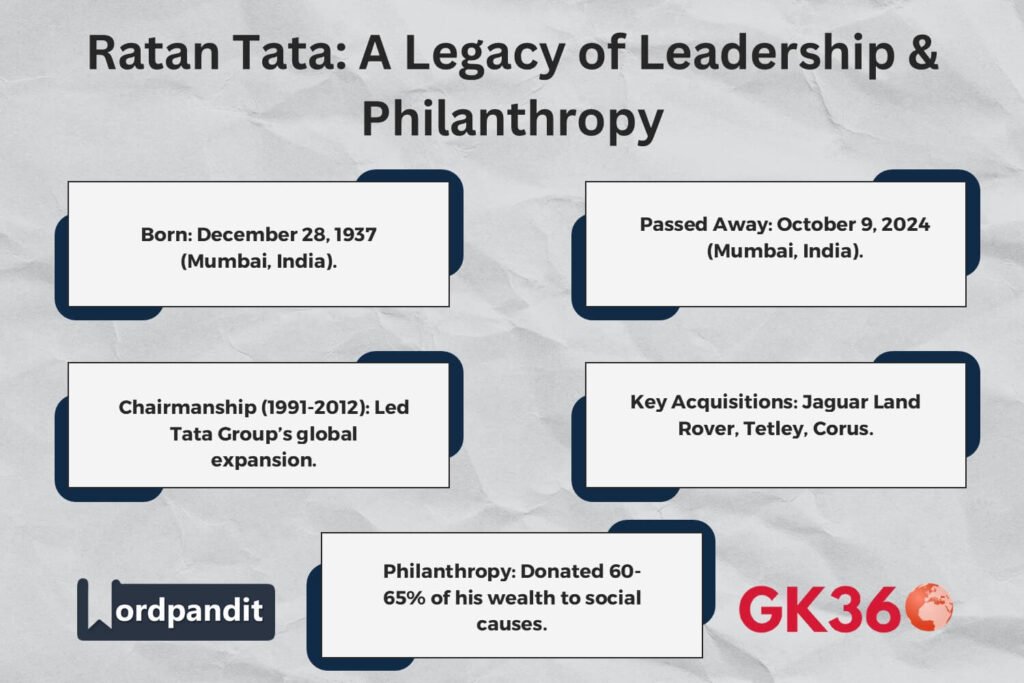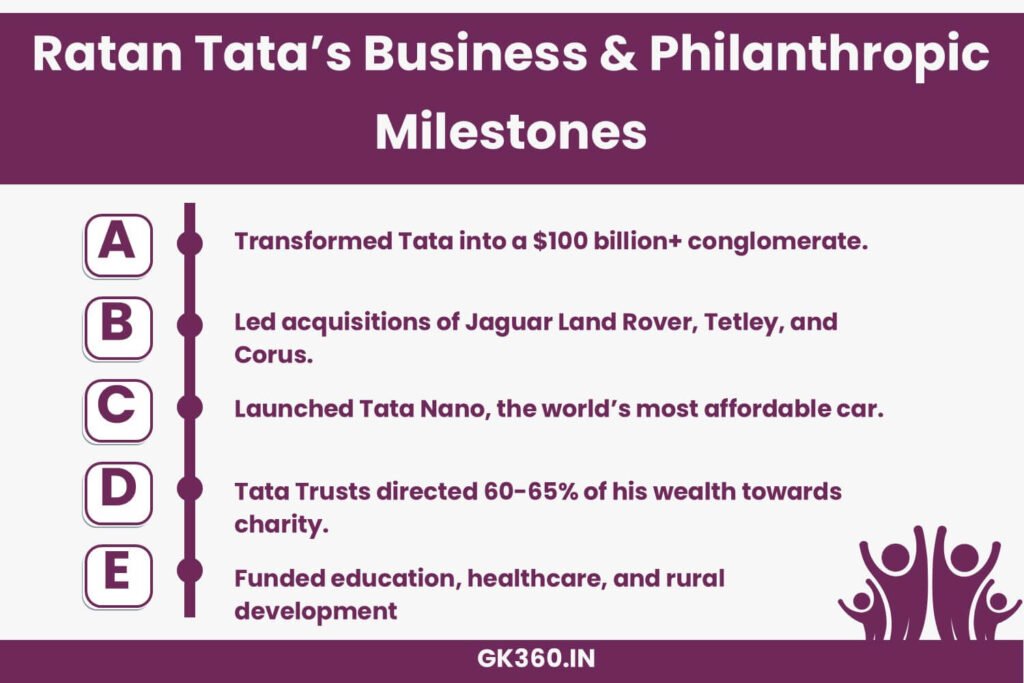Ratan Tata (1937-2024): Legacy of a Visionary Business Leader & Philanthropist
Introduction
The passing of Ratan Tata, former chairman of Tata Sons, on 9 October 2024, marks the end of an extraordinary era in Indian industry and philanthropy. At 86 years old, he succumbed to age-related ailments at Breach Candy Hospital in Mumbai. Revered as a business stalwart and a philanthropic icon, Tata reshaped India’s industrial landscape and extended his influence globally. His legacy is defined not only by his corporate successes but also by his unwavering commitment to humanitarian causes, making him one of the most respected figures in Indian history.

Table of Contents
- Early Life & Education
- Career Highlights
- Major Achievements & Global Expansion
- Leadership & Challenges
- Philanthropic Contributions
- Awards & Recognitions
- Personal Life & Legacy
- FAQs About Ratan Tata
- Conclusion: Remembering Ratan Tata
Early Life & Education
Born on 28 December 1937 into an illustrious Parsi Zoroastrian family in Bombay (now Mumbai), Ratan Tata was raised by his grandmother, Navajbai Tata, after his parents’ separation when he was 10 years old. He pursued education at prestigious institutions, including:
- Campion School, Cathedral and John Connon School (Mumbai)
- Bishop Cotton School (Shimla)
- Riverdale Country School (New York) – Graduated in 1955
- Cornell University (1962) – Bachelor’s in Architecture
- Harvard Business School (1975) – Advanced Management Program
These formative years laid the foundation for his leadership style and values.
Career Highlights
Early Career
Ratan Tata’s journey with the Tata Group began in 1961 when he joined Tata Steel, working on the shop floor. In the 1970s, he managed National Radio and Electronics (NELCO), attempting to revive the struggling business. Despite an initial turnaround, external economic factors led to its eventual decline.
Chairmanship and Global Expansion
In 1991, he succeeded J.R.D. Tata as chairman of Tata Sons. His vision transformed the Tata Group from a primarily India-focused entity to a global powerhouse.
Major Achievements & Global Expansion
Key Acquisitions & Milestones
- Tetley (2000): Tata Tea acquired Tetley for USD 450 million, marking a landmark global expansion.
- Corus (2007): Tata Steel acquired Corus for GBP 6.2 billion, making it a global steel leader.
- Jaguar Land Rover (2008): Tata Motors acquired JLR for USD 2.3 billion, solidifying India’s presence in the luxury automobile sector.
Innovations & Technological Advancements
- Tata Consultancy Services (TCS) IPO (2004): Boosted India’s IT industry.
- Tata Nano (2008): Developed the world’s most affordable car.
- Tata Teleservices (1996): Expanded into telecommunications.
By 2012, the Tata Group’s revenue surged from ₹10,000 crore (1991) to over USD 100 billion, with 65% of earnings from international markets.
Leadership & Challenges
Despite his remarkable success, Ratan Tata faced several leadership challenges:
- Boardroom Conflicts: His decision to replace Cyrus Mistry (2016) led to significant corporate disputes.
- Balancing Innovation with Tradition: Tata had to navigate India’s evolving business environment while maintaining the Tata Group’s legacy.
- Acquisition Challenges: Overcoming resistance to major acquisitions like JLR and Corus.
His ability to manage these challenges reinforced his reputation as a transformational leader.
Philanthropic Contributions
Ratan Tata’s philanthropic contributions rivaled his business achievements. Through Tata Trusts, he championed causes in education, healthcare, and rural development:
- Education: Donated USD 50 million to Cornell University for scholarship programs.
- Healthcare: Funded cancer treatment hospitals in Assam, earning the Assam Baibhav award (2021).
- Disaster Relief: Contributed to COVID-19 relief and rural healthcare initiatives.
Approximately 60-65% of his wealth was directed toward charity, making him one of India’s leading philanthropists.
Awards & Recognitions
Ratan Tata received numerous accolades for his contributions:
- Padma Bhushan (2000) & Padma Vibhushan (2008) – India’s third and second-highest civilian honors.
- Honorary Knight Commander of the Order of the British Empire (KBE) (2009).
- Assam Baibhav (2021) for social service.
- Honorary Officer of the Order of Australia (2023).
Personal Life & Legacy
Despite his immense success, Ratan Tata led a simple life. He never married but remained closely connected with his family. His passion for cars and aviation was well known, and his humility and ethical leadership made him a role model for future generations.
FAQs About Ratan Tata
- What was Ratan Tata’s biggest achievement?
His leadership in globalizing the Tata Group and acquiring Jaguar Land Rover, Tetley, and Corus stand out as landmark achievements. - Why didn’t Ratan Tata marry?
Tata once shared that he came close to marrying, but circumstances led to a different path. He chose to dedicate his life to business and philanthropy. - How much of his wealth did Ratan Tata donate?
Approximately 60-65% of his wealth was allocated to philanthropy through Tata Trusts. - What leadership qualities made Ratan Tata successful?
His visionary thinking, ethical leadership, risk-taking ability, and commitment to social causes set him apart. - What industries did Ratan Tata transform?
He revolutionized steel, automobiles, IT, and telecommunications, making Tata Group a global force.
Conclusion: Remembering Ratan Tata
Ratan Tata’s contributions to business, philanthropy, and innovation ensure his place as one of India’s most influential leaders. His ability to blend corporate growth with social responsibility serves as a blueprint for ethical leadership. His passing is a great loss, but his legacy will inspire future generations.
“True leadership is not measured by wealth, but by the impact left behind.” – Ratan Tata
Key Takeaways Table
| Aspect | Details |
|---|---|
| Full Name | Ratan Naval Tata |
| Born | December 28, 1937 (Mumbai, India) |
| Passed Away | October 9, 2024 (Mumbai, India) |
| Chairmanship | Led Tata Group (1991-2012) |
| Key Business Achievements | Acquired Jaguar Land Rover, Tetley, Corus; Launched Tata Nano |
| Philanthropic Contributions | 60-65% of his wealth donated via Tata Trusts |
| Education | Cornell University (Architecture), Harvard Business School (AMP) |
| Awards & Recognition | Padma Bhushan (2000), Padma Vibhushan (2008), KBE (2009), Order of Australia (2023) |
Related Terms:
- Ratan Tata Death News 2024
- Ratan Tata Biography & Achievements
- Ratan Tata Business & Leadership
- Tata Group Success Story
- Ratan Tata Philanthropy Contributions
- Ratan Tata Jaguar Land Rover Acquisition
- Padma Vibhushan Ratan Tata
- Tata Trusts Social Impact
- Tata Nano & Indian Automotive Industry
- Global Expansion of Tata Group






